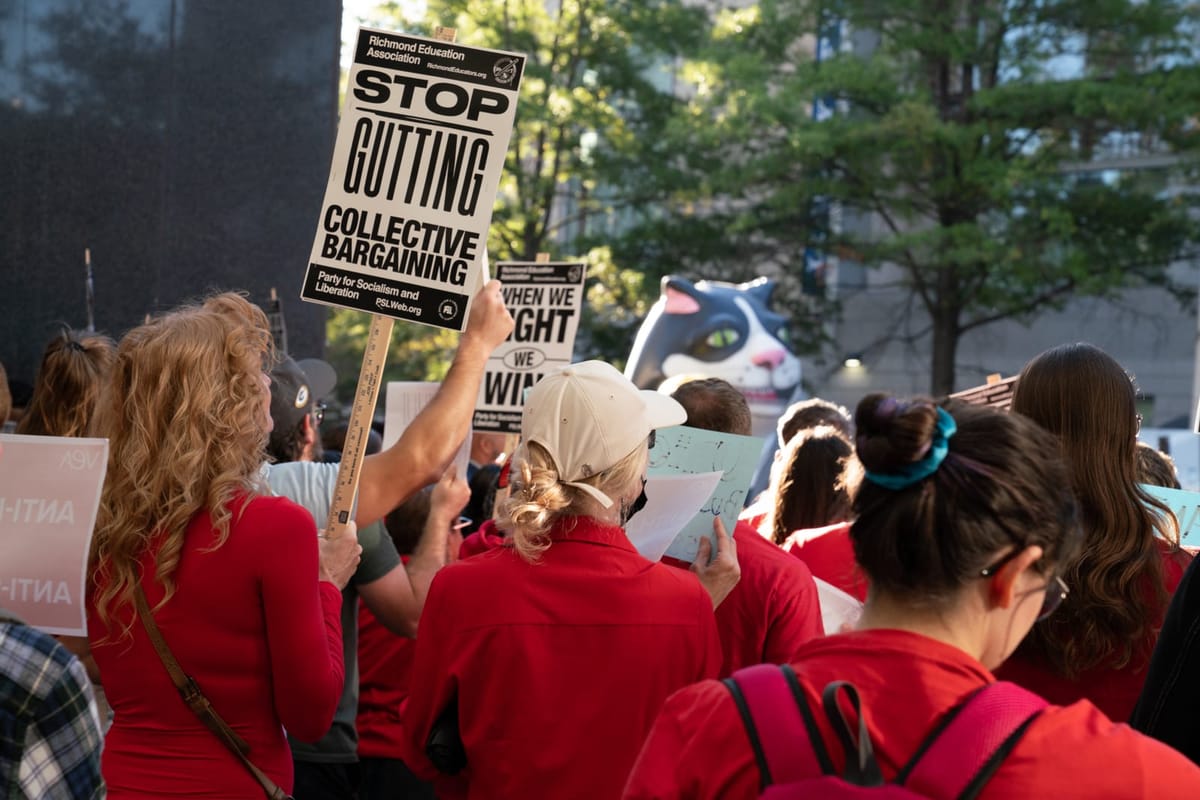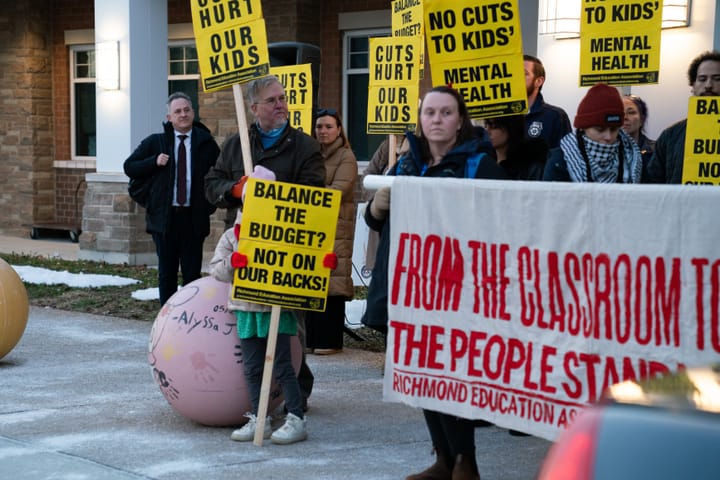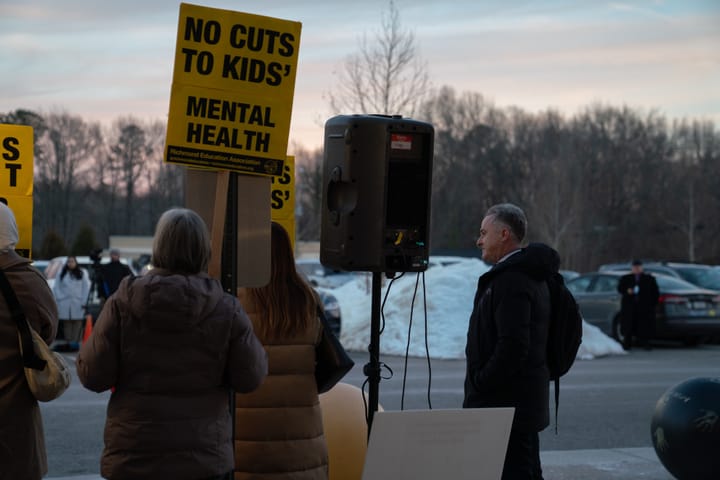RPS unions divided on collective bargaining changes ahead of Tuesday vote

After a whirlwind week of meetings aiming to build consensus on collective bargaining policy, the unions representing Richmond Public Schools employees are divided on whether that goal was achieved.
The School Board will decide during Tuesday’s meeting whether to approve the new policy, reject it or potentially defer the vote for at least another month.
The new amendments come from a month of private meetings held between school administrators and union representatives that were meant to help both sides reach a deal.
While some concessions were made and are now reflected in a document recently made available to the public, leaders with the Richmond Education Association, which represents the district’s teachers, were frustrated with how the meetings were structured, according to emails obtained by The Richmonder.
“The membership, including myself, have not been happy with how this policymaking process has gone,” REA President Andrea Bryant wrote in an email to the superintendent and School Board. “This has led the REA members to vote ‘NO’ to any changes to the resolution without a public process that allows for all stakeholders to have input.”
Superintendent Jason Kamras perceived the meetings differently. In a Friday email, he said that while all groups did not achieve all of their goals at a Wednesday meeting, there was a collective agreement that ended in handshakes and a celebration of the moment.
“I gave you my word that I would uphold my end of the bargain and bring this compromise to the Board for consideration,” he said, adding that he had uploaded the document. “I respectfully invite you to join us by upholding the commitments you made on Wednesday as well. I pray we avoid unnecessary acrimony and choose instead to celebrate the success we jointly achieved.”
Quinton Robbins, the organizing specialist for Teamsters Local 322, wrote in an email that negotiations and agreements did not begin until the unions’ last meeting with administrators on Nov. 5, calling the previous meetings “an attempt to stall.” When Teamsters Local 322 and REA asked the division to provide its reasoning for the original changes presented in October and the costs it was attempting to eliminate from the process, “it took the administration two weeks” to present such, he wrote.
The discussion has been over the rules that will govern collective bargaining between the district and the unions representing employees. The division said in previous statements and during the October meetings that the reason for their changes was to save costs and make certain procedures more efficient, in addition to receiving feedback from employees.
Contrary to Bryant and Robbins, James Smith, president of Teamsters Local 592, described the meetings as having gone “exceptionally well,” and said the new changes address his union’s concerns, which may be different from other unions. The union represents Richmond school principals, assistant principals, directors and managers.
“RPS has compromised where they can, and we’ve come to a good spot,” he said.
Smith and the union are in support of the School Board voting yes on the resolution, he said.
Chris Hollis, assistant business manager with Laborers’ International Union of North America Local 804, said that LiUNA is getting prepared for the upcoming vote School Board members have to make on Tuesday, but will stand in solidarity with the other unions.
“All of our members are just hoping that [the School Board] doesn’t vote on something that will hurt workers,” he said.
During a Thursday night town hall meeting for the 8th and 9th district, School Board Chair Shavonda Fernandez (9th District) confidently shared that all sides came to an agreement over the process, adding that a lot of work has been done during the meetings and the time was well spent.
However, “the tone has certainly changed since Thursday evening,” she said in a follow up request for comment from The Richmonder Saturday evening. While Fernandez said that she cannot make a comment on behalf of the Board in a short amount of time, she expressed gratitude for the progress made over the last month.
“I remain hopeful that all parties will continue to work towards a resolution,” she said.
Bryant and Robbins were ultimately disappointed that the Board members were not physically present in meetings between the parties to hear what the unions had to say. Instead, the leaders said Kamras served as a “middle man” by bringing back the information to the Board.
“These are rules that are designed to govern his behavior,” Robbins told The Richmonder in an interview, referring to the collective bargaining process. “It doesn't make sense that he's the middle man. [The School Board was] elected to develop policies. They are the intermediaries between different interests.”
Fernandez previously referred to state law that requires meetings between three or more elected officials to be subject to the Freedom of Information Act, telling The Richmonder in October that the meetings would have to have been rescheduled for it to be noticed.
Bryant suggested an alternative to that rationale, saying that the Board could have had no more than two members in each meeting. She and Robbins also emphasized that the unions would have preferred a more public procedure where the meetings are open to anyone and the document can pass through the Board’s Policy Committee to actively involve Board members.
“We were sending emails directly to the School Board – no offense to Kamras – but we wanted to make sure that the things we were saying were coming straight from the horse’s mouth,” she told The Richmonder, adding that all emails included the superintendent and some members did acknowledge receipt of the correspondence.
Emails show that on Thursday, the administration asked the groups to provide feedback on the revised process before noon on Friday. Robbins responded with concerns on behalf of his union – which Bryant later backed – before the deadline, which was later forwarded to all members of the School Board.
“This process foundationally was rushed, and one month was not enough time,” Bryant wrote. “I am asking you to defer this, at least another month.”
Robbins reiterated that he hadn’t heard from Kamras or any administrators and further called on the Board to intervene.
Richmond Public Schools was the first in Virginia to allow collective bargaining for employees in 2021, serving as a trailblazer for other localities. The actions leading up to the historic moment included unions, administrators and Board members, resulting in the document being disputed today. Critics of the changes when the administration first presented them in October said that the move was an about-face from what occurred four years ago.
The Richmonder is powered by your donations. For just $9.99 a month, you can join the 1,200+ donors who are keeping quality local news alive in Richmond.
The latest changes
One point of contention between the administration and the unions when the changes were first presented was the replacement of an independent panel with the School Board when a grievance or dispute occurred. Kamras argued that having a third party handle disagreements cost the division over $120,000 last year.
The new resolution allows for an independent panel that will instead consist of two representatives for the employer and two for the union – all of whom work for the division – as suggested by the unions. But all representatives must not be affiliated or involved in the matter. For example, members from Teamsters Local 322 and unassociated central office employees can serve on the panel of a dispute involving an REA’s contract negotiations with the administration.
If one party is unsatisfied with the result, they can appeal to the School Board.
The recently amended process also changes the negotiating process.
Rather than negotiating on broad topics for contracts, a union and the administration can present ten specific proposals each that can be included in the collective bargaining agreement. Each party must present the proposals 30 days before the first negotiation meeting. The administration initially proposed each party be allowed to discuss two topics each, which unions were unhappy about. The duration of each contract will also remain at three years, compared to the division’s previous recommendation of five.
Some provisions that stayed in the collective bargaining process still remain as sticking points for the groups. The leaders alleged that Kamras did not uphold certain provisions he agreed to incorporate or strike out from the process.
As presented in October, unions are still required to notify – without needing permission – a school leader about union meetings on RPS property.
“We talked specifically and agreed that it’s not appropriate that employee associations give advanced notice for site visits because that can result in retaliation,” wrote Robbins to Kamras. “That needs to be taken out.”
The administration also stood by an original removal of a provision that allowed unions to have access to membership’s home addresses. Kamras said that the administration received feedback from employees who did not want their home addresses to be accessible. During the Wednesday meeting, Robbins wrote that he contested that, adding that concerns about privacy should be addressed in a contract and not a public policy.
Robbins told administrators that he does not believe “the drafting of new language was done in bad faith but that these topics are very complex” to be addressed in a month.
Bryant said that there is potential for more progress if more time is allotted and if the Board is directly involved. But if time can’t be allotted, Bryant said her union’s biggest push at Tuesday’s meeting will be to ask the Board to vote no.
Contact Reporter Victoria A. Ifatusin at vifatusin@richmonder.org






